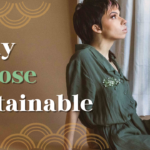Sustainability is more than just a buzzword; it’s a moral and practical imperative. In a world grappling with climate change, resource depletion, and social inequalities, making sustainable choices is paramount. This blog post delves deep into the reasons why choosing sustainability is not just important but essential for our planet, society, and the well-being of future generations.

1. Environmental Conservation
The environment is a delicate ecosystem that sustains all life on Earth. By choosing sustainability, we actively participate in its conservation. Sustainable practices reduce resource consumption, minimize pollution, and protect ecosystems. Whether it’s reducing plastic waste, conserving water, or embracing renewable energy sources, our choices directly impact the health of our planet.

2. Reduced Waste: A Path to Zero Waste
Waste generation is a global issue, with landfills overflowing and oceans choked with plastic debris. Sustainability aims to minimize waste through recycling, repurposing, and reducing single-use items. This not only saves valuable resources but also reduces the environmental and health hazards associated with waste disposal.


3. Energy Efficiency: A Cleaner Energy Future
The energy we consume has a profound impact on the environment. Sustainable choices prioritize energy efficiency, lowering energy consumption and greenhouse gas emissions. Energy-efficient appliances, green building practices, and renewable energy sources contribute to a cleaner, more sustainable energy future.

4. Economic Benefits of Sustainability
Sustainability is not just an environmental issue; it’s an economic one too. By adopting sustainable practices, we can often realize cost savings in the long run. Energy-efficient homes and appliances lower utility bills, while sustainable agriculture can enhance food security and reduce economic vulnerabilities.


5. Social Responsibility: Empowering Communities
Sustainability goes beyond environmental concerns; it encompasses social responsibility. Sustainable practices often promote fair labor conditions, ethical sourcing, and community engagement. Choosing products and companies that prioritize social responsibility contributes to social equity and poverty alleviation.

6. Health and Well-being: A Sustainable Lifestyle
Many sustainable choices lead to healthier living environments and lifestyles. Reduced exposure to toxic chemicals in products, access to fresh, locally grown organic foods, and clean air and water contribute to improved health and well-being.


7. Resilience: Adapting to a Changing World
Sustainability fosters resilience. Sustainable practices in agriculture, for example, can help communities adapt to changing climate conditions and ensure food security. Resilience is crucial in a world facing environmental and economic shocks.

8. Resource Availability: For Future Generations
Sustainability ensures that resources remain available for future generations. By conserving resources today, we guarantee that our children and grandchildren will have access to the same resources and opportunities we enjoy.


9. Innovation and Green Jobs
The pursuit of sustainability drives innovation. Sustainable technologies and practices often lead to the creation of new job opportunities in green industries. This not only stimulates economic growth but also aligns with a vision of a more sustainable economy.

10. Global Responsibility
Our choices have far-reaching consequences. Sustainability is a global issue, and our decisions impact countries, ecosystems, and communities around the world. By choosing sustainability, we contribute to global efforts to address environmental and social challenges.


11. Quality of Life
Sustainability enhances the quality of life. Cleaner air and water, access to green spaces, and healthier food contribute to a higher quality of life for individuals and communities. Sustainability is not just about surviving but thriving.

12. Long-Term Viability: A Secure Future
Unsustainable practices can lead to resource depletion and environmental degradation, jeopardizing our long-term viability. Sustainable choices ensure a more secure future for all, where resources are preserved and ecosystems thrive.









